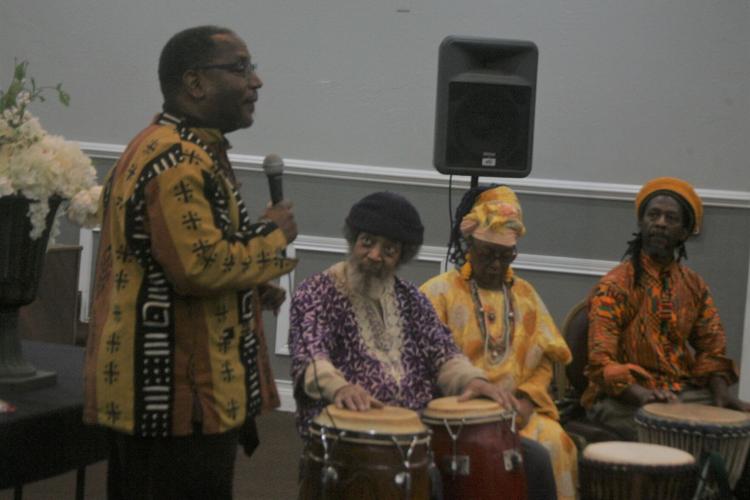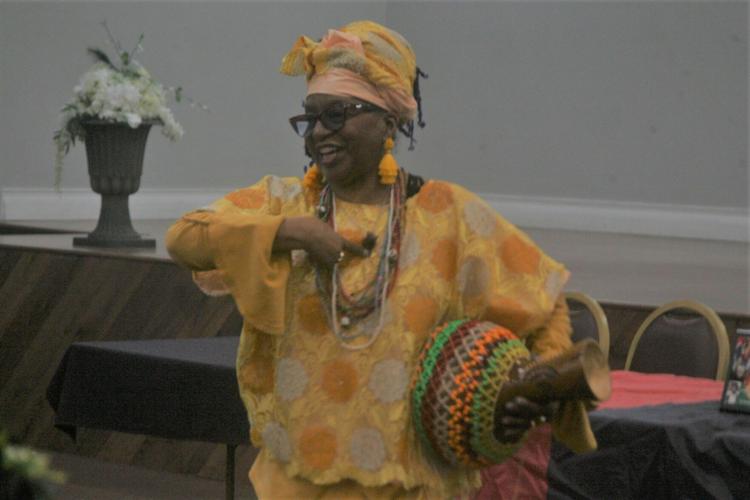The Rev. Dr. John Jackson, left, pastor of Trinity United Church of Christ in Gary, addresses the Kwanzaa celebration Monday at The Diamond Center in Gary.
Dressed in West African clothing, Kposivi Clark, of Gary, performs an African dance at the Kwanzaa celebration Monday at The Diamond Center in Gary.
Logan English, 9, of Gary, and Salim Abdul-Khaliq, of Chicago, light one of seven candles at the Kwanzaa celebration Monday at The Diamond Center in Gary.
The Rev. Dr. John Jackson, pastor of Trinity United Church of Christ in Gary, pours water in memory of the deceased during the libation portion of the Kwanzaa celebration Monday at The Diamond Center in Gary.
GARY — Looking at the history of Black people, the Rev. Dr. John Jackson commented, “We have done so much with so little. We can do the impossible with nothing.”
The pastor at Trinity United Church of Christ in Gary, Jackson spoke Monday at an annual service celebrating Kwanzaa, which is a seven-day celebration of African American culture.
The Diamond Center hosted a Kwanzaa celebration, presented by the Gary Kwanzaa and Juneteenth Committee and the National Civil Rights Institute and Hall of Fame.
Jonathan Boose and Kwabena Rasuli have been putting on the Kwanzaa celebration for 22 years.
“It’s about passing down the culture, the culture of our people, not rap music,” Boose said. "This is about family. The seven principles of Kwanzaa sustain us.”
An annual observance, Kwanzaa runs from Dec. 26 to Jan. 1.
Each of the days of Kwanzaa is dedicated to one of its seven principles. These include unity, self-determination, collective responsibility, cooperative economics, purpose, creativity and faith.
Unity was the theme Monday, Boose said, but community members addressed all seven.
The word Kwanzaa is taken from "matunda ya kwanza," Swahili for first fruits. Maulana Ron Karenga, an African American college professor, author and activist, created the celebration in 1966.
Rasuli said Karenga was influenced by the late Marcus Garvey, head of the Universal Negro Improvement Association.
Kwanzaa, Rasuli noted, is a “time to reflect on the previous year and get ready for the next year.”
Alma Wickes, of Gary, who has attended past Kwanzaa ceremonies, cited the seven principles as “very important to the community, not just the Black community but society as a whole.”
She cited the principle of cooperative economics. “When we support each other by bartering and spending money in the community,” Wickes said, “it helps to enrich and sustain our community.”
Among the entertainers were members of Rise Training Academy in Chicago, who demonstrated a form of African-Brazilian martial arts.
Tinta Forte, the instructor, said Kwanzaa “gives us time to reflect on our community and ways we can interact with our community.”
Ludeen Kilgore, assisting Boose and Rasuli, said Kwanzaa is “something we own. It’s ours. It brings the community together,”
Some people, such as Kposivi Clark, of Gary, came in African garb. She wore a bright yellow Yoruba, as worn in West Africa. She, as did others, cited the seven principles.
“These are principles you live by, guidelines for developing good character,” she said. “That’s something all people can use.”





Post a Comment